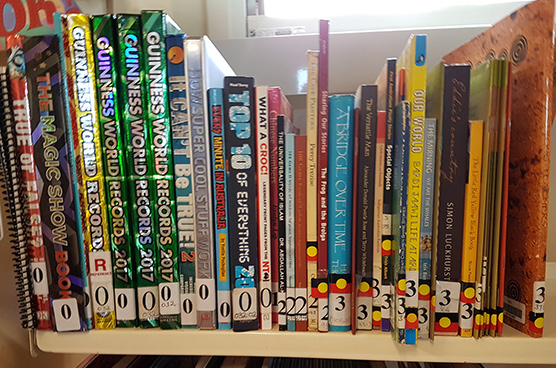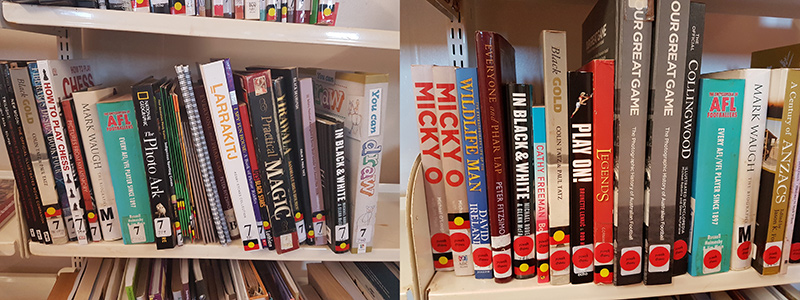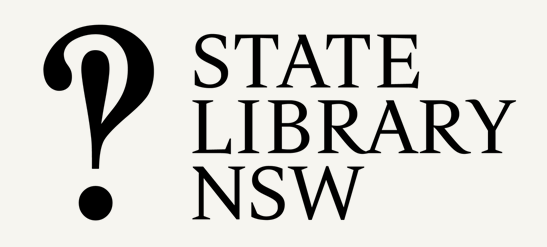Background
The Northern Territory Library (NTL – now known as Library and Archives NT, or LANT) has a longstanding relationship with the Northern Territory public library network, which comprises 11 municipal libraries and 21 community libraries. The library administers operational funding grants through the Public Library Funding Agreement, and provides public library collections funding through a Library Resource Allocation. The library also facilitates workplace support and ongoing professional learning for library staff, and provides centralised infrastructure through the Library Management System.
In 2015, a new Library Sector Services Manager commenced at the NTL and engaged in an extensive visitation schedule of NT Aboriginal Community Libraries. During these visits NTL staff observed that in some libraries signs had been erected around the collection explaining the terms fiction and non-fiction. Further conversations with Aboriginal Library Officers revealed that the concepts of ‘fiction’ and ‘non-fiction’ were largely absent in Australian Aboriginal culture.
NTL staff also observed that the standard classification system used in NT public libraries, the Dewey Decimal System (DDS) had been simplified in Aboriginal Community Libraries. Instead of a full DDS with numerical coding from 0-1000, items were grouped according to numbers 0-10 but not shelved numerically.
There are two main issues with this simplified version of the Dewey Decimal System:
- As per direct feedback from Aboriginal Library Officers, the way items are grouped on shelves can appear to be arbitrary.
- In the majority of Northern Territory Aboriginal Community Libraries, non-fiction collections are predominantly comprised of 300’s (social sciences) and 700’s (the arts) but within this simplified version of the Dewey Decimal System there is no way to refine these into smaller subject headings.
Conversations with Aboriginal Library Officers and Regional Council staff identified a lack of engagement with the Dewey Decimal System and collections. Many of the Aboriginal Library Officers reported that there is little use of the collection, and community members were unable to navigate the classification system to find preferred titles or subjects. Aboriginal Library Officers stated that they could not explain the classification system to community members as they themselves were unable to navigate the classification system successfully.
In East Arnhem Land, this simplified version of the Dewey Decimal System does not recognise Yolŋu mathematical concepts (Christie, 2007). Western numerical systems have limited meaning in East Arnhem Aboriginal communities and recommendations from workshops held on country with Charles Darwin University and Yolŋu Aboriginal Consultants Initiative is that “Yolŋu children need to have their own mathematical foundations in place before they can benefit from Balanda maths” (Charles Darwin University, 2007).
Description
In 2017, the Northern Territory Library partnered with East Arnhem Regional Council to re-imagine a new and different classification system for Galiwin’ku Community Library. Galiwin’ku is a small town located on the remote Elcho Island and is home to the Yolŋu people. Yolŋu means ‘Aboriginal person’ in the languages of North East Arnhem Land. Approximately 3,000 people live in Galiwin’ku and access to the island is limited for non-Yolŋu people.
The concept was to reform existing collection classification from a traditional Western library-orientated structure to a culturally relevant user-orientated structure and layout.
A pilot workshop was held in October 2017 and included Galiwin’ku Aboriginal Library Officers, local elders and community members, a senior staff member from East Arnhem Regional Council and a staff member from the Northern Territory Library. Together the group reviewed existing Yolŋu knowledge management structures and then transferred that Yolŋu knowledge map to the library collection.
The workshop was a success, and an initial classification system was developed which was presented to the Galiwin’ku Local Authority who endorsed the proposed system with some minor linguistic changes. The final Galiwin’ku Classification System is entirely in Yolŋu Matha and does not use any numerical codes. The system reflects local cultural knowledge management and concepts, as shown in the photo below.

Outcomes
The Galiwin’ku Classification System moves power over the collection back into the hands of the local community. Historically, ordered collection items would be catalogued and end processed at Northern Territory Library with NTL staff deciding where items should be classified. Today, ordered items are catalogued but not end processed at the Northern Territory Library. Spine labels from the new Galiwin’ku Classification System are held at Galiwin’ku Library and decision making on where each item is classified now resides with Aboriginal Library Officers. Galiwin’ku Aboriginal Library Officers now have authority of where each collection item is classified and placed in the collection.
Through this new process, new collection development guidelines were developed by Galiwin’ku Aboriginal Library Officers based on the new classification scheme. The objective is primarily to increase items written by Aboriginal Australians, for Aboriginal Australians.
In April 2018, a return visit to Galiwin’ku occurred for a final evaluation once the new classification system had been in place and operating for some months. Both original Galiwin’ku Aboriginal Library Officers had since left the community and in place was a newly hired library officer who had only recently commenced at the library and had no previous experience or knowledge of libraries.
On discussions with new Galiwin’ku Aboriginal Library Officer, it was found that having no other experience in libraries, she took the system entirely for granted. Feedback provided was that the classification system was completely intuitive, it was simple, it was in language and could be easily explained to anyone in community. In fact, the Aboriginal Library Officer was curious as to why the collection would be organised in another way?
The methodology chosen for evaluating the pilot was outcomes based evaluation. The focus for evaluation reflected the user experience and whether the quality of experience had improved. Questions about circulation and collection use will be reviewed over a longer period of time.
Overall, what was found in Galiwin’ku speaking with library officers and community members was a strong sense of pride and ownership of the classification system.
“There is always a Balanda way to do things, but this is our way.”
Aboriginal Library Officer, Galiwin’ku Community Library, 2018

Lessons learnt
The methodology of the pilot was not evidence-based in that no known solutions existed at a grassroots level for this issue. Because of this, practice based practice was utilised as a methodology. Essentially, new solutions and knowledge could be discovered by Northern Territory Library staff not controlling the problem solving process.
The pilot was also successful because of the close and trusted partnership between Northern Territory Library and East Arnhem Regional Council. East Arnhem Regional Council strongly support their library services and are considered by the Northern Territory Library to be a leader in remote library service delivery. East Arnhem Regional Council have committed staff who acted as champions for the project. This pilot would not have been successful without their active persistence and passion for the project.
A limitation of this pilot is the geographic isolation needed for the success of this pilot. The Galiwin’ku Community Library could develop its own knowledge classification structure with no fear that the dominant Western culture typified elsewhere in Australia would take precedence over local classification or worldviews. This isolation may also explain why no other potential classification solutions were discovered in the research phase.
Library and Archives NT is now in discussions with a number of Northern Territory Regional Councils to initiate this process in other remote community libraries.
Related links
Galiwin’ku library closes book on the Dewey Decimal System to prioritise Yolngu culture – ABC Radio Darwin, 22 August 2018









